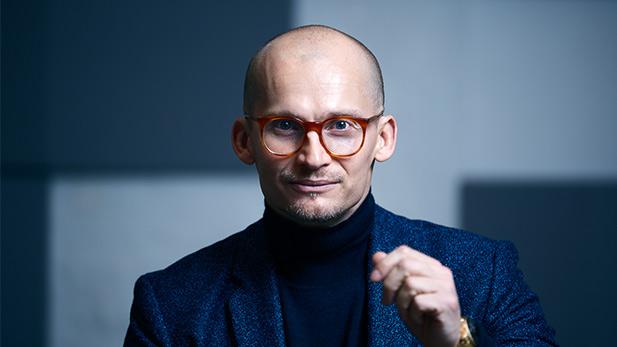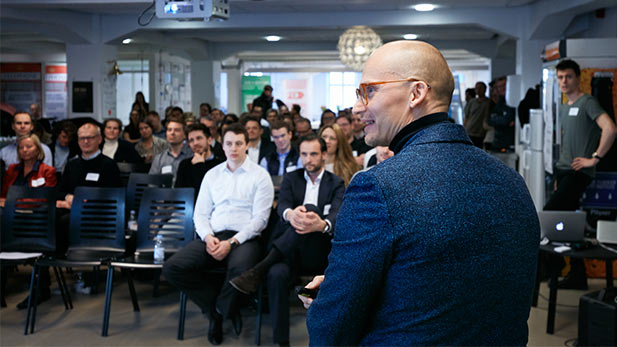Christian Stadil: The first step is investing your time

Photo: Bjarke MacCarthy
By: Jakob Vesterager
You don't get to speak with one of the top players in a field every day. However, this was the case for the participants of CSE and CBS Alumni's seminar series for alumni who wish to become involved in a start-up, as Christian Stadil, Danish executive and chairman, held a lecture.
He is owner and CEO of the global conglomerate Thornico, which includes more than 120 operational businesses dealing with food production, technology, shipping, real estate, finance, fashion, and sports.
Stadil has received international awards for his management style and sits on a number of national and international think tanks and boards. Christian Stadil has also co-authored books about management philosophy, creativity, and personal development, and he is also an adjunct professor of creative leadership at CBS.
If you weren't able to participate in the event, we have gathered some pearls of wisdom from Christian Stadil's lecture and the following interview with CBS Alumni.
About engaging in a start-up
I have a great appreciation for CBS. The graduates from there are extremely capable. Therefore I would like to recommend those who wish to engage in a start-up to contribute the so-called "sweat capital". Help with what you can. If you have a degree in Business Economics and Auditing, you can make your skills within finance and accounting available in return for getting a share of the company.
If it was me, I would help start-ups by being their mentor in return for capital and shares/options. It is a good way of joining and contributing - almost risk-free.
About getting the good idea
Most good ideas are based on the ability to see a market need. A lot of wannabe entrepreneurs are always searching for good ideas. It hardly ever works. It is about finding a need or optimising something that already exists.
Everybody dreams about getting a trailblazing idea that turns everything upside down; however, most often innovation is about reformulating, redesigning and adjusting something that already exists. If you can distribute a letter for less money than PostDanmark can, then you have a business opportunity.
Getting ideas requires knowledge. And knowledge does not come from dreaming about it. So I always tell people to get out there. Get out and work! Try things out, work for free if you have to.
Photo: Bjarke MacCarthy
About testing the idea
I always use the toothbrush test to determine whether a company is worth investing in. Can I see myself or someone I know using this product, service, or platform more than just a few times? And will it make life easier or better for them or me in some way? We have a company who takes care of your laundry and leaves it at your doorstep. I can see myself using that service - and it makes my life much easier.
I also always look for data points, which prove that the idea works. If you are able to demonstrate a lot of Google searches for a product, you can deliver, then I am a lot easier to convince.
About tech start-ups
The opportunities for people who wish to invest in or create start-ups are endless. Usually I get around ten inquiries a day about new business ideas. On the one hand, it is great; however, on the other hand, I cannot help seeing red flags.
If you visit a hairdresser, I'm afraid that they have an idea for an app called Cutmedoo or something to that effect. Everybody has their own little tech idea, but in my opinion, half of these tech start-ups won't survive. There won't be a bubble - but we will see a correction. I have seen signs over the past year, and things have changed just in the two past months. It has become more and more difficult to get funding, and people are becoming more and more afraid.
My advice is that it is no longer enough to be able to generate traffic on the internet. You have to think about income and and cash flow and all these boring things - they are becoming increasingly essential.
About interesting markets
Not long ago, experts claimed that there would be 9 billion people on Earth in 2050. Now they claim that the number is closer to 11 billion. All these people have to eat, so in my view the market for food is extremely interesting. Two years ago, everybody was talking about tech; however, to large investment companies food is red hot.
Photo: Bjarke MacCarthy
About having the right attitude
The worst an entrepreneur can do is to seem too loose. It is great to be social, but if you are too laissez-faire, it won't work - especially if you don't know your numbers. There are tons of charismatic entrepreneurs who contain too much hot air and jazz hands. I hate jazz hands.
In order to convince me, you have to appear robust, be realistic, and know your numbers. You have no idea how many hockey stick budgets I have seen - so be conservative, sympathetic, and credible.
About choosing the right investment
I never engage in a business I don't understand or have an interest in. Basically, I only invest in businesses, where I'm able to contribute. I cannot bring anything to the table, if I am not interested in or understand the concept.
About not being a CBS graduate
I got a military education first, then I studied law and started working, and then time flew by. It is hard to combine law studies with being in the USA and making agreements with Jennifer Lopez' agent to get her to wear hummel clothes.
It is always easy to make statements about the past and how everything could have gone in another direction. But knowing what I know today, I would probably have chosen the MSc in Economics and Business Administration - and especially now, where CBS has such an entrepreneurial environment. Then I would probably have been a more committed student.
Register and read more about the seminar series, which Christian Stadil was part of
Relevant articles:
Christian Stadil becomes adjunct professor
Entrepreneurs and investors meet at CBS
Are you familiar with CBS' offers for alumni?
In Your Own Words: Nels Mortensen, Senior Manager